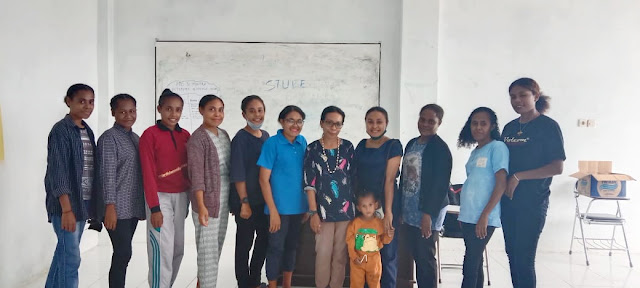By: Adel Mambrasar.
My
name is Adel Mambrasar, a Faculty of Teacher Training and Education (FKIP)
student of Muhammadiyah Education University (UNIMUDA), Sorong, majoring in
Elementary School Teacher Education (PGSD). I am from Yenanas village, South
Batanta district, Raja Ampat regency, West Papua Province. Yenanas village is
located on Batanta Island, one of the four major islands in Raja Ampat. Most
people in Yenanas work as farmers, fishermen, laborers, private employees, and
state civil servants but some are still unemployed. The women in Yenanas
village have a natural talent for making handicrafts, namely making ‘noken’ or
bags from knitting yarn and coconut leaf sticks, making plates and flower pots
from coconut leaf sticks, making flowers from used bottles and dried betel nut
shells, and making tablecloths from wool and straws. The people of Yenanas
village are known to be very friendly to anyone who visits. Its tourism spots
are Yat Island and Ayem Island. These two tourist attractions are often visited
by people around the village of Yenanas and even from Sorong.
My first experience with Stube HEMAT was when Rev. Grace Nanuru held an event in Yenanas to introduce Stube HEMAT activities. She invited several students and youth in Yenanas, including me, to discuss and to talk more about what Stube HEMAT is. We welcomed her effort and initiative which made us so excited to look forward to the event. The event came to a reality when Rev. Grace came to Yenanas and explained what Stube HEMAT is and how it cares for young people and students. She also shared her experience while studying in Yogyakarta and what she did in Raja Ampat. Hearing this, my friends and I were so motivated to get to know Stube HEMAT more, and finally, we joined because Stube HEMAT offers new things and experiences that are not found on campus.
Even
recently, my friends and I took a chance for managing a gender discussion held
on the Unimuda campus. Besides I got new material and understanding about
gender and equality between men and women, I also learned how to manage Stube
HEMAT activities, and how to invite students to come for discussions and I
found that it was not easy to invite people.
In the exposure to Pam, I learned about women and their support for the family economy, especially women who make VCO (Virgin Coconut Oil), bath soap from VCO, and other products. They are trained by tourism managers by bringing trainers from Bali and Germany and advised to use environmentally friendly materials. Before the pandemic, the sales of VCO, soap, and hand-body were quite good because tourists came to this tourist area, but during the pandemic, no one came, so sales decreased even though there were still buyers from residents and tourist spots. Hopefully, the pandemic coming to an end, and tourism in Pam can be bustling again.
For
me, women can help their families, especially to improve the economy with their
skills in processing something as long as there is training and assistance like
the women in Pam. I can share this experience with the women in my village, the
handicrafts can develop and be widely known. It is just a matter of how young
people and students do not wait until they are old to learn skills, but from
now on, they have to explore skills and the products can be sold so that youth
and students can be independent. Thank you, Stube HEMAT.***






.jpg)


Comments
Post a Comment